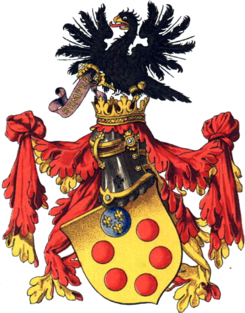The House of Medici was a political dynasty, banking family and later royal house that first began to gather prominence under Cosimo de' Medici in the Republic of Florence during the late 14th century. The family originated in the Mugello region of the Tuscan countryside, gradually rising until they were able to found the Medici Bank.
The bank was the largest in Europe during the 15th century, seeing the Medici gain political power in Florence — though officially they remained simply citizens rather than monarchs.
The Medici produced four Popes of the Catholic Church—Pope Leo X (1513–1521), Pope Clement VII (1523–1534), Pope Pius IV (1559–1565), and Pope Leo XI (1605);[1] two regent queens of France—Catherine de' Medici (1547–1559) and Marie de' Medici (1600–1610); and, in 1531, the family became hereditary Dukes of Florence.
In 1569, the duchy was elevated to a grand duchy after territorial expansion. They ruled the Grand Duchy of Tuscany from its inception until 1737, with the death of Gian Gastone de' Medici. The grand duchy witnessed degrees of economic growth under the earlier grand dukes, but by the time of Cosimo III de' Medici, Tuscany was fiscally bankrupt.
Their wealth and influence initially derived from the textile trade guided by the guild of the Arte della Lana. Like other signore families they dominated their city's government.
They were able to bring Florence under their family's power, allowing for an environment where art and humanism could flourish. They fostered and inspired the birth of the Italian Renaissance along with other families of Italy, such as the Visconti and Sforza of Milan, the Este of Ferrara, and the Gonzaga of Mantua.
The Medici family came from the agricultural Mugello region,[2] north of Florence, being mentioned for the first time in a document of 1230.[citation needed]The origin of the name is uncertain, although Medici is the plural of medico, meaning, "medical doctor".[3]
Rise to power
The Medici family was connected to most other elite families of the time through marriages of convenience, partnerships, or employment, as a result of which the Medici family had a position of centrality in the social network:several families had systematic access to the rest of the elite families only through the Medici, perhaps similar to banking relationships.
This has been suggested as a reason for the rise of the Medici family. Members of the family rose to some prominence in the early 14th century in the wool trade, especially with France and Spain.
Despite the presence of some Medici in the city's government institutions, they were still far less notable than other outstanding families such as the Albizzi or the Strozzi.
One Salvestro de' Medici was speaker of the woolmakers' guild during the Ciompi revolt, and one Antonio was exiled from Florence in 1396. The involvement in another plot in 1400 caused all branches of the family to be banned from Florentine politics for twenty years, with the exception of two: from one of the latter, that of Averardo de' Medici, originated the Medici dynasty.
The Medici Bank was one of the most prosperous and most respected institutions in Europe. There are some estimates that the Medici family were the wealthiest family in Europe for a period of time. From this base, they acquired political power initially in Florence and later in wider Italy and Europe.
A notable contribution to the profession of accounting was the improvement of the general ledger system through the development of the double-entry bookkeeping system for tracking credits and debits. This system was first used by accountants working for the Medici family in Florence.
https://en.wikipedia.org/wiki/House_of_Medi
To be continued



